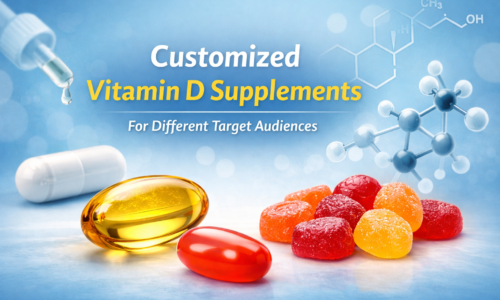
The pet nutrition market is experiencing unprecedented growth. According to ADM’s 2025 Global Pet Nutrition Insights report, 85% of pet owners now believe that proper nutrition and supplements for their pets are just as important as for humans. Even more remarkable, 78% of pet owners are actively seeking products that may extend their pets’ lifespans, clearly demonstrating the strong market demand for functional, science-backed pet nutrition solutions.
Driven by the “pet humanization” trend, the US pet dietary supplements market is projected to grow annually by 15% to 20%, significantly outpacing the overall pet market. This growth is fueled by rising pet ownership, increased consumer willingness to invest in pet health, and brands successfully attracting health-conscious buyers through innovative formats, flavors, and functionalities modeled after human health products.
As pet nutrition shifts from niche to mainstream, this is the ideal time for entrepreneurs to launch a pet supplement brand in the USA.
Understand the Pet Supplement Market
Successful pet nutrition brands must accurately grasp the health areas that pet owners care about most. Several key categories are currently showing significant growth:
- Joint Health: Glucosamine, chondroitin, and MSM are leading ingredients for managing hip and joint issues in older dogs and large breed dogs. Joint health supplements remain one of the most in-demand products in the dog supplement market.
- Digestive and Gut Health: Probiotics, prebiotics, and digestive enzymes are in high demand, helping to alleviate diarrhea and constipation and improve nutrient absorption.
- Skin and Coat Health: Ingredients like omega-3 fatty acids (fish oil) and biotin are highly sought after for a shiny, healthy coat.
- Calm and Mood Support: Products containing functional ingredients like CBD (regulatory considerations apply), L-theanine, and chamomile are rapidly gaining popularity for issues like separation anxiety and thunderstorm phobia.
- Immune Support: Antioxidants (vitamins C & E) and functional mushrooms (reishi, cordyceps) are emerging as key ingredients in immune-boosting supplements for dogs and cats.
Define Your Pet Supplement Brand Concept
The market is vast, but competition is fierce. A clear brand positioning is key to standing out. Ask yourself: What makes my brand unique?
- Organic and Natural: Claim to use all-natural, certified organic ingredients, free of artificial additives and preservatives.
- Functional Specialization: Don’t be a one-size-fits-all; instead, focus on a specific niche, such as “joint care specifically designed for small dogs” or “sports recovery formula for show dogs.”
- Veterinary Recommendation/Formulation: Collaborating with veterinarians to develop products or highlighting “veterinary recommendation” in marketing can significantly build trust.
- Transparency and Sustainability: Disclosing the source of ingredients, using eco-friendly packaging, and committing to ethical sourcing will appeal to the younger generation of environmentally conscious pet owners.
Partner with a U.S.-Based Supplement Manufacturer
Currently, most pet supplement brands opt for an outsourced production model, relying on Contract Development and Manufacturing Organizations (CDMOs) to handle manufacturing while focusing internal resources on sales and marketing. However, this model’s sustainability is being tested by the surge in market demand.
An industry insider noted, “If the market continues to grow at its current pace, production capacity is very likely to become a key bottleneck constraining industry development within the next three years.” Given the scarcity of top-tier CDMOs capable of offering unique specifications, the trend makes selecting reliable manufacturing partners critically important.
For new startups, partnering with a compliant and trustworthy US-based supplement manufacturer remains the safest and most efficient path to market entry.
Core Screening Criteria
- GMP Certification and FDA Compliance: The facility must adhere to the US Food and Drug Administration’s (FDA) Good Manufacturing Practices (GMP), ensuring that the production environment, processes, and quality control meet human food/drug-grade standards.
- Low MOQ (Minimum Order Quantity): Startups are sensitive to inventory costs, so they should choose factories that offer flexible MOQ policies to reduce initial financial strain.
- R&D Capability: Assess whether the factory has an experienced R&D team capable of translating product concepts into scientific and effective formulations.
- Dosage Form Versatility: The ability to produce the required dosage forms, such as soft chews, hard pellets, powders, liquid drops, etc.
- Formula Protection: Ensuring that proprietary formulas receive full protection against disclosure to competitors.
- Supply Chain Stability: Evaluating the stability and quality consistency of raw material procurement to ensure reliable long-term supply.
- Track Record and Reputation: Investigating the brands the factory has previously served and requesting samples for evaluation when necessary.
Develop Your Custom Formulas
A good concept alone isn’t enough; it also requires a scientifically proven formula.
Functional Ingredient Selection: Based on your product’s positioning, choose ingredients with scientific research support. For example, glucosamine and chondroitin are suitable for joint health, and L-theanine is suitable for calming products.
Dosage Form Selection:
- Soft chewable tablets: They offer the best palatability, are popular with pets and owners, and are the mainstream form in the market.
- Powders: They are easy to mix into food and are suitable for high-dose supplements.
- Liquids: They are easy to feed and adjust dosages, especially for small dogs and cats.
Palatability: No matter how good a product is, it’s useless if pets don’t eat it. The contract manufacturer should provide professional palatability testing and flavoring solutions.
Ensure FDA and AAFCO Compliance
In the United States, while pet supplements do not require FDA premarket approval like drugs, they must operate under the FDA’s regulatory framework and adhere to strict labeling regulations.
FDA regulations: Products must be safe, used as claimed on the label, and must not contain unapproved drug ingredients. Manufacturing facilities must be registered with the FDA.
AAFCO: The Association of American Feed Control Officials is responsible for defining ingredients and setting nutritional standards for pets. Ensure your product labeling complies with AAFCO requirements, especially for claims such as “complete nutrition.”
Labels Must Include
- Brand and product name
- Species name: The animal species for which the product is intended must be specified; images alone do not meet this requirement.
- Quantity statement: Expressed as weight in U.S. units, followed by the metric equivalent.
- Ingredient statement: Uses AAFCO-approved ingredient names, listed in descending order of predominance.
- Guaranteed analysis: Includes minimum or maximum percentages of crude protein, crude fat, crude fiber, moisture, etc.
- Calorie content statement: Expressed in kcal/kg and kcal per familiar household unit of measure.
- Nutritional sufficiency statement: Required only for a complete and balanced diet.
- Manufacturer/guarantor information: Name and mailing address.
Branding, Packaging, and Marketing
A compelling brand story and packaging design are the first touchpoints that attract consumers.
Packaging Design: Professional, aesthetically pleasing, and clearly convey the product’s core value. Consider using a transparent window to allow consumers to see the actual product.
Marketing Channels:
- DTC Official Website: Establish a brand website to control user data and all profits, and build a community through content marketing (blogs, social media).
- Amazon: Leverage the world’s largest e-commerce platform to generate massive traffic through optimized product listings (titles, keywords, images, and videos).
- Retail Channels: In later stages of development, you can explore local pet stores, chain pet supermarkets (such as Petco and PetSmart), or veterinary clinics.
Summary
Creating a pet supplement brand requires not only business acumen but also scientific formulations and regulatory compliance. By partnering with a US GMP-certified manufacturer, you can transform your creative ideas into high-quality products that meet international standards and quickly enter the pet health market. Looking to build your own pet supplement brand? Contact our professional team for a free formulation consultation!









